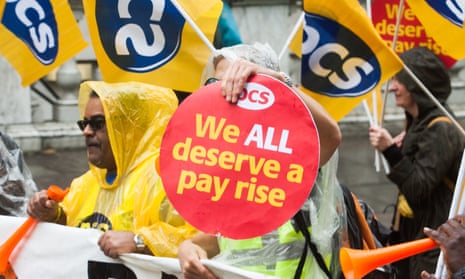Even at the best of times, it is not easy to be a public sector worker. Today, it has never been harder.
Far from some of the stereotypes bandied around the right-wing press about gold-plated pensions and inflated wages compared with the private sector, the pay situation for membersof our PCS union who work for the UK government is dire.
Since 2010 they have been subject first to a complete pay freeze and then a 1% pay cap. This year, when the government said that, despite pay offers of more than 1% for other public sector staff, pay rises would be capped at 1%-1.5% for civil servants and those working in related areas, our members said they’d had enough and voted for strike action.
Lower-paid civil servants have recognised they are being singled out as second-class workers and this has fanned the flames of discontent. Some 85%of our members voted to strike – the biggest vote in our history. But strike action was thwarted because we did not meet the arbitrary turnout threshold laid down in the draconian Trade Union Act 2016.
Although we will pursue all legal avenues to rectify this injustice, we are dusting off and regrouping for future battles ahead on pay. At this year’s TUC congress in Manchester – its 150th anniversary – we are calling for a joint union campaign for pay increases above the rate of inflation.
Our own research shows that the effect of the pay cap will be that by 2020, average civil service pay will have fallen in value by more than 20%. Given what our members have had to put up with, our 5% claim this year was a moderate demand.
One of our members, for instance, who works in the Animal and Plant Health Agency, says it’s a constant struggle to make ends meet each month, even without a young family to raise. “I am no better off than I was in the eighties,” she says. “I have not had a pay rise for years, which I find extremely frustrating as I was intending to retire next year and now I cannot afford to.”
Another member, who works at the Rural Payments Agency, says her pay has been virtually static since 2009. That year, she and her husband, who works for the NHS, took on a mortgage. Since then, their pay has stagnated, but transport, food and bills have all increased in cost. It’s been a struggle, she says, despite her husband taking on a part-time evening job and renting out their spare room to lodgers. “I estimate that I am now £400 a month short on wages to bring me back to the living standard I had 10 years ago.”
For another member, who works for the Land Registry, debt and bankruptcy have become a reality. Registered as disabled, this civil servant lives on his own and works 20 hours a week. Not having a pay rise has resulted in him accruing debts just to be able to live. “I now can’t afford to pay my debts off, resulting in me having to declare myself bankrupt.”
It is absolutely disgraceful that Theresa May and her ministers have ended the pay cap for some public sector workers and not her own staff. This is why at this year’s TUC conference, trade union unity will be essential. Coordination between all the public sector unions pushing for above inflation pay rises would represent a major challenge to the government.
This what we are calling for in our motion on pay. But we are clear: whatever other unions do, PCS will fight tooth and nail for pay justice in 2019.
